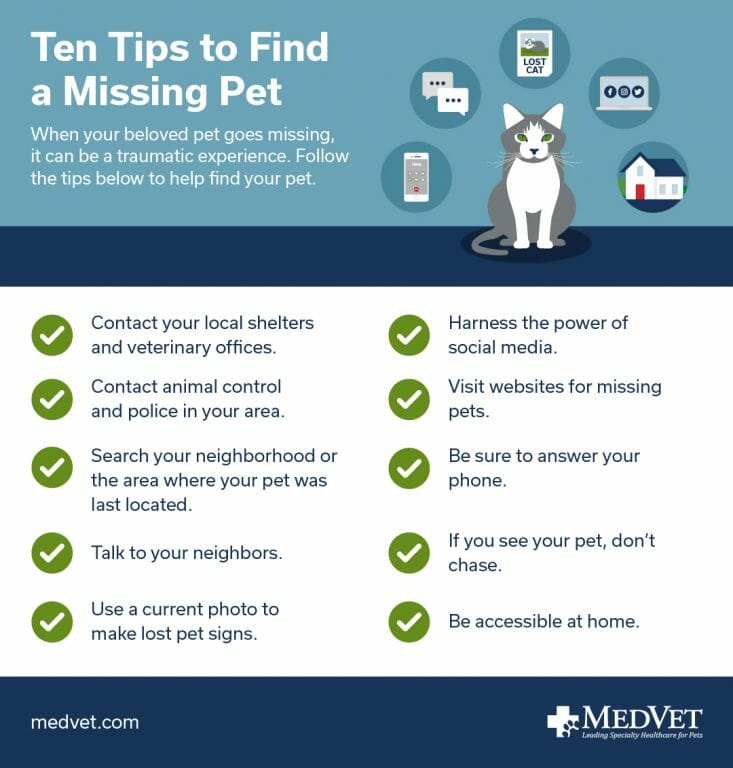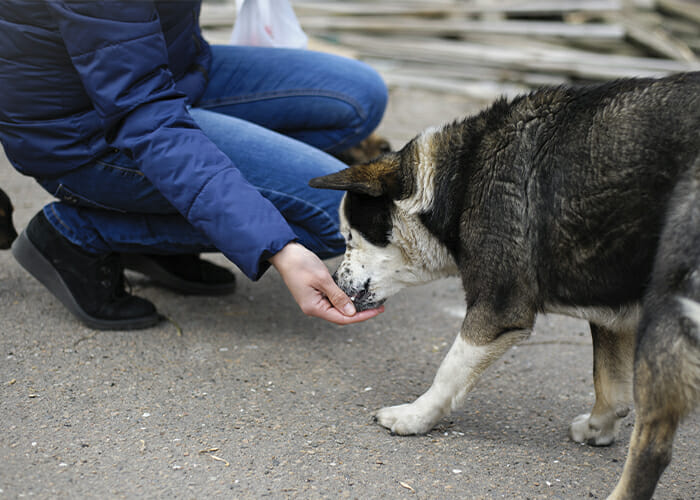10 Tips to Find a Missing Pet and Bring Them Home Safe
When your pet goes missing, it can be a traumatic experience. Follow these tips to help find your pet.
One of a pet parent’s worst fears is finding out that their favorite furry family member has gone missing. A hurried family member can forget to lock a gate, an excited pet can slip out of a collar, or maybe you just have a curious escape artist. A variety of scenarios exist where even the most vigilant pet owners and providers can end up in this situation. So, what steps should you take if your pet goes missing?

1 – Contact your local shelters and veterinary offices.
Often when people find a wandering animal, they drop them off to a nearby rescue, shelter, or veterinary office. Check with local shelters and rescues every day, and if possible, visit them in person. Sometimes it’s difficult to describe exactly what your pet looks like, or a volunteer may not be completely familiar with the differences in breeds. Search online to find shelters and veterinarians close to you.
2 – Contact animal control and police in your area.
You can call the non-emergency number for your local police department. These individuals typically work closely with the animal control agency, who can then be dispatched to lend their help.
3 – Search your neighborhood or the area where your pet was last located.
When searching, call your pet’s name and be sure to look in places where your pet could get trapped or hide like a garage, shed, or under a porch. Search by day and by night. Sometimes a pet may hide during the day but emerge later at night when the neighborhood is quieter. Sometimes carrying some food or a favorite treat can help lure your pet back to you as well. Take an extra collar and leash with you in case your pet has lost their collar so that you can safely get them home if you find them.
4 – Talk to your neighbors.
Take flyers or information to your neighbors and let them know to be on the lookout. You can also talk to your mail carrier or other delivery drivers or work crews who may be in your area. They are out and about all day, and the more people who know your pet is missing, the more likely it is that someone will spot your pet.
5 – Use a current photo to make Lost Pet signs.
Lost Pet signs can be posted in your neighborhood, as well as in area businesses or community buildings like the library. Make sure it’s a current photo of your pet and include any pertinent information that might help someone identify your pet. Include their name, breed, color, approximate size, and any identifying marks. Also include the ways to get in touch with you if they see your pet. If you’re able, you can offer a reward which might entice people to spend a few extra minutes searching. Printing them in color is also helpful so that your pet is more recognizable.

6 – Harness the power of social media.
Share information and a current photo on your social media profiles right away and look for community groups you can post in as well. Many neighborhoods and towns have community groups on popular social media sites. Some groups are focused just on lost pets. Be sure to visit those pages to see if people post pictures of a “found” pet. Often neighbors will post sightings in groups not knowing who the pet’s owner is.
7 – Visit websites for missing pets.
Head to the web and check out sites that are meant to help find your pet like PetFBI, Center for Lost Pets, Fido Finder, Lost Dogs of America, Lost-Cat.org, Tabby Tracker, FindToto, and Lost My Doggie. There may also be similar services for your local area so do a quick Internet search to find any resources close to home.
8 – Be sure to answer your phone.
You’re putting your phone number out there everywhere so make sure you pick up the incoming calls. You may want to consider changing your voice mail message to note that you are looking for your pet. In it, you can leave instructions with another way to reach you or how people can share information about sightings in case you miss a call.
9 – If you see your pet, don’t chase.
Even the happiest and most loving pets can get scared if they end up in unfamiliar territory. Chasing after them can scare them even more, or they may think it’s a game. Instead, get down on their level and talk calmly. Try repeating their name and other phrases you have used often with your pet. This is also a time when having food or treats can be helpful.

10 – Be accessible at home.
Consider leaving the gate open to your yard or the door to a garage or shed cracked in case your pet happens to find their way back home. And try to make sure someone is always home if you are able. If your pet has a tag with a current address, a good Samaritan may bring them to your home. If that happens, you’ll want to make sure someone is there to let them in.
Bonus Tip – stay positive
It’s important to stay positive and hopeful. If your pet is chipped and wearing a collar with an ID tag, it significantly increases the chances of finding a missing pet and bringing them home safely. You can learn more about ID options for your pet here.
Pet Care Resources
For ways to ensure your pet lives a happier, healthier life, visit our Pet Care Resources library.
View ResourcesPet Care Resources
For ways to ensure your pet lives a happier, healthier life, visit our Pet Care Resources library.
View Resources